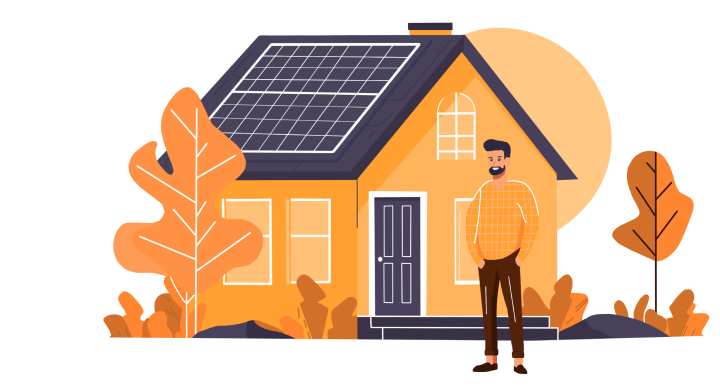Are you often searching for "installation solar power" to prepare for a greener lifestyle? Switching to renewable energy is a smart choice for both the environment and your budget, and Solar Energy Host is here to help you through the process.
This guide will help you assess your house's potential for a home solar electric system, explore solar installation options and understand the financial benefits of going green. Keep reading to ensure you make the best decisions for your energy needs.
Step #1: Assess your home's solar power potential before starting.
Measure your home's sun exposure.
Solar energy systems work best in places with plenty of direct sunlight. If you're interested in "installation solar power," find out how much sunlight your home typically receives on a daily basis.
You can use resources like solar maps or local weather data to get accurate estimates and determine if solar panels can generate enough energy for your household needs. Additionally, understanding seasonal changes is important, especially if your area has changing weather conditions.
Check for obstructions around your roof.
Solar panels need direct sunlight to produce the most energy. During peak sunlight hours, check your roof for significant obstructions like shadows from trees, chimneys or buildings. If you find any, consider removing them or choosing another photovoltaic installation spot for proper panel placement that can significantly boost your solar power system's output and efficiency.
Step #2: Check if your roof is suitable for solar panels before moving forward.
Make sure your roof can support panels.
Solar panels are a long-term investment, typically lasting for more than 25 years, so it's important that your roof is in good condition before installation. This is among the top things you'll learn when searching for "installation solar power."
Look for leaks, structural weaknesses or damage that might affect the panels over time. A professional roof inspection can confirm if your roof can handle the weight of the equipment for residential solar power. Addressing any necessary repairs or upgrades before installation will help you avoid possible complications down the line.
Optimize roof angle and orientation.
Ideally, your roof's angle should match your geographical latitude and the panels should face the equator—south if you're in the northern hemisphere or north if you're in the southern hemisphere.
If your roof doesn't meet these conditions, mounting solutions for the installation of solar panels can adjust the panels' tilt. These adjustments can significantly boost your solar panel system's energy output.
Check roof size for panel installation.
The size and available area of your roof determine how many solar panels you can install. If space is limited for your "installation solar power" project, consider small, high-efficiency panels that produce more energy, like monocrystalline solar panels. You can also look into ground-mounted systems if your roof cannot support the panels.
Exploring these options can help you choose the right solar panel system to generate enough electricity for your needs.
Step #3: Compare the cost of solar installation and financing options.
Solar energy requires an initial investment, but you'll save on electricity bills over time. Upfront expenses usually include inverter and solar panel cost as well as solar inverter installation labor. It may also include the cost of solar battery storage, depending on your needs.
Though the initial expense may be high, an "installation solar power" project often pays for itself within five to ten years, depending on system size, local energy rates and your energy use. Additionally, you can increase your home's value when you install a solar panel, making it a smart long-term investment.
Seek savings: Find incentives and tax credits.
To encourage the adoption of solar energy, many states offer incentives that significantly reduce the cost of solar panel installation. Check what rebates, grants and programs are available in your area to help shorten the payback period of your investment and begin saving on energy bills sooner.
If the upfront cost to install solar panels is a concern, there are several financing options that can make solar installation more manageable. Solar loans let you spread the cost over time, easing the financial burden as you shift to renewable energy.
Solar leasing, on the other hand, lets you rent the panel system and pay a monthly fee for the energy it generates—a good option if you don't want to own the system. Some energy providers offer power purchase agreements, where you buy the energy produced at a set rate without needing an initial investment.
Step #4: Choose Solar Energy Host for the best installation solar power options.
Find local solar installers easily.
Solar Energy Host makes finding reliable and highly-rated local solar installation companies easy. Just enter your basic details and we'll help you connect with experienced local installers who can help you learn more about "installation solar power." These solar panel installers know local regulations and best practices, ensuring your solar project is compliant and optimized for long-term success.
Through our platform, you can save time and effort with competitive quotes for solar installation services delivered straight to you.
Compare quotes tailored to your needs.
One of the biggest advantages of using Solar Energy Host is the ability to compare multiple quotes in one place. You can review detailed offers from different solar installation companies, each offering various cost structures, equipment quality, warranties and service options.
Frequently Asked Questions (FAQ)
Are solar panels only effective in sunny climates?
No, solar panels work well in various climates, not just sunny ones. While they produce the most energy under direct sunlight, modern technology allows them to capture energy even on cloudy days. This means that even regions with less direct sunlight can still benefit from solar power.
What is the difference between a grid-tied and off-grid solar system?
A grid-tied solar panel system is connected to your local electrical grid. This connection allows you to draw power from the grid when your panels aren't generating enough energy. On the other hand, an off-grid solar power system isn't connected to the grid and usually needs battery storage to save extra energy for later use.
What happens if my solar panels generate more energy than I use?
In a grid-tied system, excess energy is sent back to the grid. This surplus energy can earn you credits through net metering, which can help reduce your electricity bill when your panels aren't producing enough power. In an off-grid system, extra energy is stored in batteries, ensuring you have power when sunlight is limited.
Solar Energy Host: Your gateway to affordable solar solutions
At Solar Energy Host, we connect you with leading local solar providers, ensuring you receive competitive quotes for your home solar installation cost. Our secure platform simplifies the process, allowing you to compare options efficiently. Let us help you step into a sustainable future with the potential for significant savings.
Interested in solar installation costs for your home? Explore your options with us!














